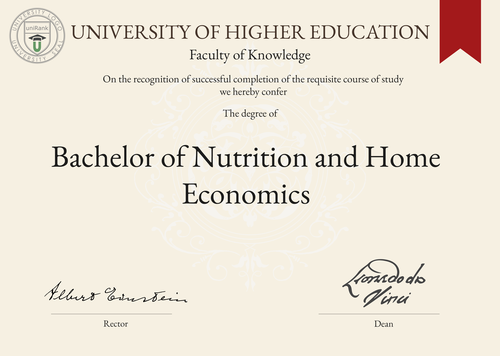
Bachelor of Nutrition and Home Economics (B.N.H.E.)
Guide to Bachelor of Nutrition and Home Economics Program/Course/Degree
Bachelor of Nutrition and Home Economics (B.N.H.E.)

Program Name
Bachelor of Nutrition and Home EconomicsProgram or Degree abbreviation
B.N.H.E.Duration range
The duration of the program typically ranges from 3 to 4 years.Tuition range
The tuition fees for the program can vary depending on the country and university, ranging from [insert range].Overview
The Bachelor of Nutrition and Home Economics program is designed to provide students with a comprehensive understanding of nutrition, food science and home economics. It combines theoretical knowledge with practical skills to prepare graduates for careers in various sectors related to nutrition and home economics.Curriculum Overview by year
The curriculum is structured to cover a wide range of subjects related to nutrition and home economics. The following is a general overview of the curriculum by year: Year 1: Introduction to Nutrition, Food Science, Basic Cooking Techniques, Introduction to Home Economics Year 2: Advanced Nutrition, Food Chemistry, Meal Planning and Preparation, Family Resource Management Year 3: Community Nutrition, Food Safety and Sanitation, Consumer Economics, Research Methods Year 4: Clinical Nutrition, Food Product Development, Advanced Home Economics, Internship/PracticumKey Components
The key components of the program include: - In-depth understanding of nutrition and its impact on health - Knowledge of food science and its application in meal planning and preparation - Practical skills in cooking, food safety and sanitation - Understanding of home economics principles and their application in managing resources - Ability to conduct research and analyze data related to nutrition and home economicsCareer Prospects
Graduates of the Bachelor of Nutrition and Home Economics program can pursue various career paths, including: - Nutritionist or Dietitian in hospitals, clinics, or private practice - Food product development specialist in the food industry - Community nutritionist in government or non-profit organizations - Home economics teacher or educator - Researcher in the field of nutrition and food scienceSalary Expectations
The salary expectations for graduates of the program can vary depending on factors such as location, experience and job position. On average, nutritionists and dietitians earn a median annual salary of [insert range]. For a more accurate understanding of salary expectations, you can utilize the Job Sites Search Engine, from our sister site jobRank, which searches over 4,600 job sites worldwide. Make sure to specify not only the job title but also the country you are interested in.Conclusions:
It is important to note that the duration, tuition fees, curriculum, key components, career prospects and salary expectations of the Bachelor of Nutrition and Home Economics program can vary: a) By the chosen country or location where to study the program b) By the chosen university where to study the program Visitors interested in pursuing this specific degree can use the uniRank World Universities Search Engine to find universities offering the Bachelor of Nutrition and Home Economics program anywhere in the world.World Universities Search Engine
search for Bachelor of Nutrition and Home Economics (B.N.H.E.) and add the Location (country, state etc.) or specific University you are interested in studying at.
Query examples:
- Bachelor of Nutrition and Home Economics (B.N.H.E.) United States
- Bachelor of Nutrition and Home Economics (B.N.H.E.) United Kingdom online
- Bachelor of Nutrition and Home Economics (B.N.H.E.) Australia international students
- Bachelor of Nutrition and Home Economics (B.N.H.E.) University of California
- Bachelor of Nutrition and Home Economics (B.N.H.E.) University of London tuition fees
- Bachelor of Nutrition and Home Economics (B.N.H.E.) University of Sydney scholarships
Share Program/Course
Interesting? Share this program/course/degree info with your friends now.